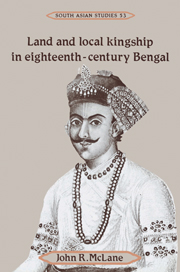Preface and acknowledgments
Published online by Cambridge University Press: 13 October 2009
Summary
That the major landed magnates occupied an enigmatic position in South Asian society became clear to me in a previous research project, on early Indian nationalism. Indian National Congress supporters, with some exceptions, showed a respect to the maharajas (great kings) of both British and princely India that seemed out of proportion to objective measures of their power and influence. The fact that the major landholders acted as partners of the colonial rulers and helped them extract taxes from the cultivating tenantry did not destroy their reputations with many fellow Indians. Long after the colonial government had spiked the maharajas' last dangerous cannon and dismissed their non-display soldiers, educated nationalists appointed titled landholders to head their cultural organizations and listed them first in newspaper accounts of public meetings. Even if some maharajas seemed to live out European fantasies of “oriental” pageantry and excess, they apparently fulfilled indigenous cultural expectations, especially in the rural population, about how society should operate, about the merit to be gained by honoring a superior being. Maharajas were almost as much a part of the normative, hierarchically arranged landscape as Brahmins.
One impulse to embark on the present study, therefore, was desire to understand the persistence of kingship's esteem in local imaginations, after the colonial government had appropriated ruling functions from the big landowners and left them with powers more ceremonial than substantive. A broader purpose was to search for clues about how agricultural land served simultaneously to uphold the ritual order and to support political authority.
- Type
- Chapter
- Information
- Land and Local Kingship in Eighteenth-Century Bengal , pp. xiii - xviPublisher: Cambridge University PressPrint publication year: 1993



